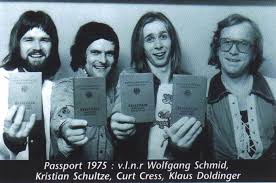The Story Of Passport's Kristian Schultze
Printed From: Progarchives.com
Category: Progressive Music Lounges
Forum Name: Prog Blogs
Forum Description: Blogs, Editorials, Original articles posted by members
URL: http://www.progarchives.com/forum/forum_posts.asp?TID=103533
Printed Date: November 23 2024 at 17:04
Software Version: Web Wiz Forums 11.01 - http://www.webwizforums.com
Topic: The Story Of Passport's Kristian Schultze
Posted By: presdoug
Subject: The Story Of Passport's Kristian Schultze
Date Posted: August 02 2015 at 18:50
|
The following is an article written by me about the late composer, arranger, producer and musician Kristian Schultze. Please feel free to make comments or add additional information. Kristian Schultze was born Kristian Wladimir Schultze on January 21st, 1945, in Frankfurt, an der Oder, Brandenburg, Germany. He grew up in Hamburg, Rio de Janeiro and Berlin, and studied music at the Konservatorium and Musikhochschule in Berlin, Wiener Akademie, and Jazzschool Graz. He moved to Munich in 1968, and was involved as a composer, arranger, producer, and musician for various artists, for movies, television, and theatre. At age 23, he came to prominence with a soundtrack to the film "Go For It, Baby". By the early 1970s, Schultze was recording as a keyboardist in the Jazz-rock outfit "The Bridge", also later dubbed the Kristian Schultze Set, releasing a brilliant record on Tempo Records in 1972. (which was remastered in 2002) One of his biggest musical moves was joining Klaus Doldinger's fusion band Passport in 1973, playing Fender Piano and Organ, along with Doldinger on sax and synths, Wolfgang Schmid on bass and guitar, and Curt Cress on drums. This lineup would record and release the four landmark studio records "Looking Thru" in '74, "Cross-Collateral" in '75, "Infinity Machine" in '76, and "Iguacu" in '77. The band did tours of Asia, the USA, Australia, and Germany, and also there were two live "Doldinger Jubilee" concerts released in 1974 and 1975, respectively, both featuring Kristian Schultze. Other Passport related recordings he appeared on as keyboardist were the solo albums of Wolfgang Schmid called "Wolfhound" and Curt Cress's "Curt Cress Clan", both from 1975. In 1977, he left Passport, and became part of fusion group Snowball, and along with Dave King on bass, Curt Cress on drums, and Roye Albrighton from the group Nektar on guitar and vocals, recorded a great record in that year called "Defroster", released in '78. In 1979, Kristian Schultze met Michael Holm, and started a studio project called "Cusco" that made 22 records that sold millions of copies, and charted near the top of the New Age music category, and received 3 Grammy nominations in the process. He also recorded and issued several solo albums. In 1985, he and his wife Birgid moved to Bad Tolz, a small village facing the Bavarian Alps, and he built a studio there and continued work as composer, arranger, sound designer, and keyboard soloist for dozens of national and international artists. From 1990 to 1993, he was a student in breath therapy (HAKOMI) and that influenced his work as a solo artist, and in Cusco. Since 2006, Schultze was on tour again with the "Passport Classic" band. Sadly, he died of a heart attack in Bad Tolz, on November 22nd, 2011. The loss of this remarkably diverse, productive and sensitive artist was a blow to the music world. I would like to dedicate this article to the life and music of Kristian Schultze.
|
Replies:
Posted By: presdoug
Date Posted: August 03 2015 at 09:20
 |